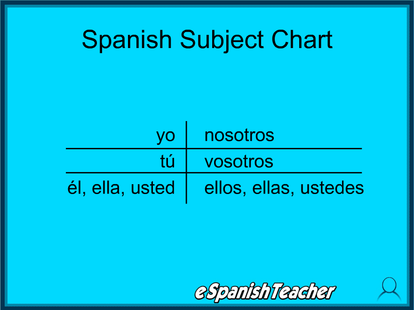 As a student Student of the Spanish language, one of the first things you'll learn is the subject pronoun chart or table (see graphic). This is a simple chart that displays the eight Spanish subject pronouns. For simplicity's sake, I refer to these as the Spanish subjects. On this blog post, I want to focus on two Spanish subject, "Usted" and "Tú". Both mean "you", however, they are used in different circumstances. Tú First, we'll start with "Tú" because it's the more common of the two subjects. It's used most often and has the meaning that is most similar to your understanding of "you" in English. This is the version of "you" that is used in friendly, less formal situations where you likely have close or casual relationships with the people you are speaking with. It's also used in informal social settings, like going out to dinner with friends or people who are roughly your same age who you might not know. Examples: Tú eres mi amigo = You are my friend Tú cantas con mi padre = You sing with my father Usted Of all the Spanish subject pronouns, "Usted" is perhaps the most difficult to understand, which is why we need a solid understanding of of "Tú" first. Usted means "you" but is considered the formal version of "you" and has the added effect of giving an extra level of respect or formality to the person with whom you are speaking. In other words, use Usted when you are speaking with someone in a formal setting or someone who deserves an added degree of respect beyond your every day accquantiances, friends, and family. Whether or not someone deserves an added level of respect varies based on who you are, your level of familiarity, your respective ages, and social status. You're probably asking yourself, "Does the Spanish language discriminate based on social standing?" The answer is a simply yes, it does. Usted es mi jefe = You (formal) are my boss Usted tuviste mucho éxito durante el año pasado = You (formal) had a lot of success last year If you a college student, you'd likely address your professors using "Usted". Likewise, if you were speaking with a government, corporate, or religious official, you would likely address that person using "usted". And in some case, you speak to the elderly using "Usted". There are exceptions to all these rules, but this is the general idea. Newer, less friendly relationships would lend to using Usted. Also, high-ranking officials in any organization would expect to be spoken to using "usted", at least until you became more friendly with the person. You would also speak to police officers and other public employees using "Usted". Friends and family typically would not speak to each other using "usted", unless it's a very young person speaking to his/her grandparent or parent. A teenager likely would not use Usted when speaking to a parent, however, a younger child might when being scolded. Likewise, bumping into someone on the street or in a store would not be an occasion to use "Usted". A good rule to follow is that the less familiar you are with someone that you meet in a formal or professional setting, the more likely you should use "Usted" until you become more familiar. Don't worry if you get it wrong. The best way to perfect your understanding of these two subjects is to use them a lot in your daily practice. Comments are closed.
|
AuthorThis is where we chat about all things Spanish. Feel free to ask a question, challenge me, passionately disagree, or rant about whatever. Just make it interesting. Archives
August 2018
Categories
All
|

 RSS Feed
RSS Feed
